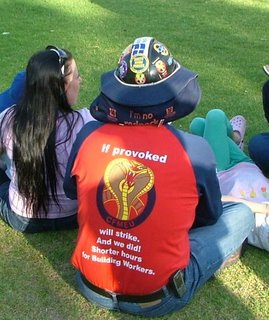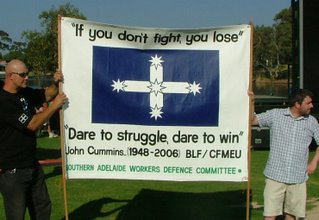
First it was Australian Prime Minister John Howard saying that public schools should appoint chaplains, and then it was South Australian Independent MP Bob Such proposing that state primary schools needed to have a religious education program.
It seems as though for some, it is the absence of the guiding hand of the Church that best explains the decline in standards of behaviour of young people.
The fact of their continual immersion in a culture shaped by US imperialism is hardly acknowledged.
There is good and bad in the culture of the United States, but overwhelmingly it is saturated with racism, with violence, with a mentality of blaming the victim and despising the weak.
Hollywood, TV and rap all contribute their share of this at the level of popular culture. US foreign policy acts it all out in real life.
In fundamental ways, traditional Aussie values were different to those of the contemporary United States.
We stuck up for the underdog and thought that two onto one was gutless. We didn’t like bullies and told them to pick on someone their own size. We stood by our mates.
We cut down tall poppies and thought that Jack was as good as his master.
We had our bad points, but got over the worst of them. We accepted that a woman’s place wasn’t necessarily at home, we got rid of the White Australia Policy and we gave indigenous Australians the vote.
But all along we remained enmeshed in the economic, cultural, social, political, military and diplomatic web of imperialism. We had the cultural cringe, the Queen, the butcher’s apron on our national flag, multinationals, ANZUS, SEATO, British atomic weapons tests, US military bases, Korea, Vietnam and Iraq.
We had Aussie Rules, but the Yanks had their own little Aussie Gurkhas whenever they wanted them.
So why this push for religious values in public schools?
In the first place it represents a failure on the part of conservatives to understand what it’s like to be young in a family that is not wealthy, and that may not be particularly stable for various reasons. When these conservatives see kids behaving badly they think of what shaped their own social values and behaviour. They don’t see it in terms of privilege and wealth but in terms of values and example. They think of Family and they think of Church. They think: it worked for me, and it will work for them. We gotta put chaplains in schools so they have some healthy influences, and get religion back on the curriculum so that they are taught good values again.
This is essentially a deficit view of teachers and public schools. And they label teachers as "trendies" or "leftists" who just want to teach kids to experiment with gay lifestyles and to question all authority.
It’s a double-dose of "blame the victim": blame the kids for their behaviour, and blame the teachers for encouraging it.
And because the conservatives are so enmeshed in reliance upon their special relationship with the United States, they dare not make critical analysis of it, nor do they promote independence from it. They certainly would never think of blaming our national servility to the US for anything to do with the values and behaviours of young people.
So John Howard makes available $90 million a year for the appointment of chaplains to schools. The same John Howard who axed programs supporting the teaching of Asian languages in schools, worth only $30 million a year.
These chaplains of Howard’s should not be confused with Christian volunteers, who already have a presence in many Government schools, and who are often referred to as "chaplains". The Christian volunteers make friends with the kids, talk to them, help them sort out personal problems, run fun activities at lunch time, recruit kids for Church youth groups and create a profile for the local Christian Churches. Some of this is legitimate, and some of it infringes on the secular atmosphere of public schooling. Some parents are happy with it, some are not, believing that it is a parent’s right to decide when, and how, and through whom their children will be involved with religious groups and religious activists.
What Howard’s proposal does is of a different order of magnitude. It puts chaplains into schools as chaplains, as officials of Government schools, on the Government payroll.
In one move it ends the historical separation of Church and State and overthrows the basic premise of a secular system of public education. It creates the impression that some religions are "more Australian" than others by virtue of their officially sanctioned presence in State schools. It will inevitably favour some religions over others, and within religions, of some denominations over others. Whilst it is theoretically possible for chaplains representing religions other than Christianity to be appointed, these will be the exception rather than the rule.
And it may not even be the exception if some people in our community, such as Ian Clarkson, Chairman of the Schools Ministry of Tea Tree Gully have their way. In a letter to the editor of the Advertiser (17/11/06), Clarkson states that "Chaplains are Christians. This is how it ought to be."
This claim to ownership of chaplaincy by the Christians is justified by saying: "Christianity is the source of the ideas from which has emerged the open, ordered, free, democratic, multicultural society that we all enjoy…"
The only problem with this is that the history of chaplaincy is multi-faith. The Jews used priests attached to their armies in a role similar to that of today’s military chaplains in Old Testament Times. Jewish chaplains have traditionally been a part of the British Armed Services, whilst in recent times both the British and US armed forces have appointed Islamic and Buddhist chaplains. Likewise, the Japanese Imperial Army that carried the enlightened philosophies of Emperor Hirohito into Eastern Asian from 1931 to 1945, also had Buddhist chaplains appointed - for all the good they did.
And the sad thing is that the same kids who are anti-social, violent, disrespectful and rude now, will be anti-social, violent, disrespectful and rude in the future because they will remain locked out of the wealth, the success, the self-assured lifestyles of those who do well in our capitalist democracy dominated, as it is, by US imperialism.
We only have to look at the behaviour of kids in private schools to see the flaws in the argument. Sure, working class kids get involved in street gangs, and that’s not a good thing. But there are gangs (let’s not be polite about it) of private school kids who hang out at certain pubs and bars and whose behaviour is also aggressive and selfish.
Even the "best" schools have their dark side, although they are better at hushing it up than public schools. Remember when rival gangs from St Peters College and Prince Alfred College (Anglican and Uniting Church schools respectively) bashed the crap out of each other at the Adelaide Cup a few years ago?
And what about the report of this year’s "muck-up day" activities at St Peters?
A gang of about a dozen Year 12 boys went on a rampage of offensive behaviour destroying school property, in the course of which one lad was videotaped by others defecating in a school washbasin.
The poor lad may only have been doing to the washbasin what the US has been doing to the world for years, but it was hardly a good advertisement for "the values which many parents want their children to have" and which, according to Bob Such, Independent Member of Parliament, State schools can’t deliver because they don’t have religious education!
So it all comes down to this. Putting chaplains and religious education back into State schools is a recipe for no significant change in kids’ behaviour at all. Kids respond to their social environment and the opportunities for escapism and/or acting out their frustrations that are afforded through the popular media.
Trained school counsellors, who may or may not privately be Christians, atheists, agnostics, Buddhists, Maoists or followers of any other set of beliefs best serve the social and emotional needs of students. They are trained teachers whose educational qualifications support their counselling role, making them better suited to dealing with student problems in an educational setting than lay chaplains with religious agendas.
Rupert Murdoch pleaded with us, in the wake of the anti-Bush vote in the US mid-term Congressional elections, "to reject the facile, reflexive, unthinking anti-Americanism that has gripped much of Europe".
The reality is, that unless we do some intelligent, reflective thinking about the grip that the US has on us, we’re going to slide down further along the path of aping their lifestyle and their atrocious behaviour.
And the kids will keep behaving badly.



























